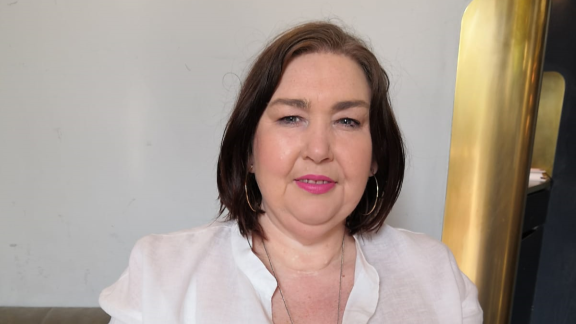From hopeless to hopeful: improving support for people with BPD

For International Borderline Personality Disorder (BPD) Awareness Month, Marsha McAdam reflects on the systemic injustices faced by people living with BPD, and highlights good practice in the UK and overseas discovered through research supported by the Churchill Fellowship.
Please note, this article contains references to self-harm and suicide.
I still remember the sense of relief I felt when I was finally diagnosed with BPD. For the first time, there was a name for what I was experiencing; a way to make sense of the chaos and persistent emotional distress that was dominating my life.
However, it still took many years of self-harming and a near-fatal overdose in 2008 before I finally received the kind of empathic care and compassion from services that I so desperately needed.
It was only then that I was referred for mentalisation-based treatment (MBT), which ultimately saved me from myself. The intensity of the therapy gave me the tools to understand why I felt the way I did and helped me make sense of the chaos that had consumed so much of my life. MBT didn’t just improve my mental health, it transformed my entire way of being. I am certain that, had it not been for MBT, I would most likely either be dead or caught up in the criminal justice system.
A note on terminology
I recognise that the term borderline personality disorder (BPD) is a contentious and often painful label for many. It carries significant stigma, can result in people being excluded from services, and in the worst cases, contributes to preventable deaths by suicide. I’ve chosen to use this terminology in this blog because there is a substantial body of internationally recognised, evidence-based research that supports early detection and intervention, which I discovered as part of Churchill Fellowship research.
What if...?
I often imagine what my own life would be like now if I had received this treatment earlier. BPD not only robbed me of my twenties and thirties, it also robbed my son of his childhood. From the age of 10 to 18, he had to be my carer. I can’t help but wonder whether he might have had a more typical childhood if I had received the support I needed sooner.
BPD is more strongly associated with high unemployment and reliance on disability benefits than either depression or anxiety, due to the profound impact this condition can have. Between 8 and 10 per cent of people with BPD take their own lives and, on average, life expectancy is around 20 years shorter than for those without the condition. It is therefore not surprising that BPD ranks as the third-highest cause of burden of disease among mental health conditions.
The term ‘complex emotional needs’ (CEN) is increasingly used in mental health settings to describe some individuals, often including those with a diagnosis of BPD. People with CEN are known to be high users of NHS services - not only mental health care, but also emergency departments and other areas. Despite representing a relatively small proportion of the patient population, they account for significant costs. According to Centre for Mental Health, people with CEN who are admitted to inpatient beds cost the NHS between £480 and £785 million annually. Yet despite this, services for people with BPD are often not fit for purpose. Support is frequently only offered when someone is already in the midst of a crisis.
Examples of good practice
It is my own living experience that drives my commitment to improving services for others who have, or are at risk of developing, BPD. I was fortunate to be awarded a Churchill Fellowship, which supports and funds individuals to explore innovations around the world and apply them in the UK. This allowed me to travel to Australia and the USA to learn about examples of good practice.
“…when identified early and met with compassionate, relational clinical care, young people are given a real chance to change the trajectory of their lives”
Through the learning afforded by this Fellowship I witnessed first-hand that, when identified early and met with compassionate, relational clinical care, young people are given a real chance to change the trajectory of their lives.
In Melbourne I spent three weeks at Orygen with Professor Andrew Chanen and his team learning about the Helping Young People Early (HYPE) model: an evidence-informed, developmentally appropriate, and replicable approach to early intervention. HYPE’s success in translating research into service design underscores the value of co-locating academic, clinical, and lived experience expertise - something that could be developed further in UK community-based models.
What I witnessed was that HYPE was more than just a model, it was a movement toward relationship-centred, youth-affirming, and humanising mental health care. It’s a system that believes in young people’s capacity for growth, refuses to give up on those hardest to reach, and recognises the central importance of connection, culture and compassion.
“…pioneering research into BPD in youth has advanced both our understanding and treatment of the condition”
For the second part of my Fellowship, I visited the University of Houston’s Developmental Psychopathology Lab, led by Professor Carla Sharp. Her pioneering research into BPD in youth has advanced both our understanding and treatment of the condition.
The university’s ADAPT Centre provides developmentally informed assessments for adolescents and young adults with emotional and relational difficulties, particularly those at risk for personality disorders. The centre focuses on functioning rather than symptoms, seeking to destigmatise personality disorders and provide early, targeted support. It also trains the next generation of psychologists, ensuring they are equipped to meet the complex needs of this group.
In my capacity in other roles including as a service user representative, I’ve also been able to identify and champion examples of positive practice here in the UK, such as EMERGE Leeds, Sequoia at NAViGO, and iROC in Birmingham, to name a few.
“Following my time in the US and Australia, I am filled with hope about how relational models of care can change the life trajectory of a young person with BPD”
Following my time in the US and Australia, I am filled with hope about how relational models of care can change the life trajectory of a young person with BPD. However, as a system we are being faced with increasingly difficult financial circumstances, I worry that the ‘young Marshas’ will be forgotten, especially during a time where we are only just beginning to see the long-term mental health consequences of the COVID-19 pandemic.
Now, more than ever, we must invest in early, effective, and compassionate care for young people who have experienced trauma and are at risk of developing BPD. Doing so will not only save money in the long term, it will save lives.
Marsha McAdam is a mental health advocate, vice-chair of the Mental Health Network and a Churchill Fellow 2023



